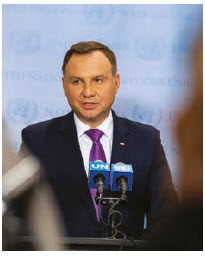
The European Union’s mounting woes over Brexit and its aftermath are just the tip of the proverbial iceberg. Europe has many other problems, some below the waterline, some above, that threaten its future. They include the fragmentation of the political landscape with a proliferation of extremist parties on the left and right that make it harder to form viable coalitions that can govern from the political centre; the anti-democratic, authoritarian proclivities of Europe’s eastern members; and the prospects of another looming Eurozone crisis triggered by the default of its third-largest economy, Italy, which, in addition to having an economy that is shrinking, suffers from double-digit unemployment and a public debt of 2.3 trillion euros.
Take the first problem. It is not populism per se that threatens Europe’s governance arrangements and prevailing open-market, open-borders orthodoxy, but the steady erosion of public support for centre-left and centre-right political parties that have traditionally governed from the middle of the political spectrum. Their traditional bases of support are evaporating as new parties on the extreme left and extreme right curry favour with voters either by being extremely “green” on environmental issues while favouring a return to “big state” welfare socialism (on the left) or promoting virulently anti-immigrant, anti-Muslim and nationalistic policies (on the far right).
The October 2018 Bavarian state elections in Germany, which knocked the wind out of the sails of the Christian Social Union (CSU) party, the CDU’s (Christian Democratic Union) political partner, offer a good illustration of the fragmentation problem. It was not just the CSU that took a drubbing from the anti-immigration Alternative for Germany (AfD) party, resulting in the CSU losing its parliamentary majority. Germany’s leading opposition Social Democrats (SPD) were even bigger losers, dropping down to single digit numbers in terms of the popular vote and faring as poorly as their counterparts in recent elections in France and the Netherlands, while the Greens made the same big gains they’ve made in Belgium and Luxembourg.
The fragmentation problem affects not only Germany, but also countries such as Italy, whose politics are volatile and unpredictable at the best of times. In recent years, however, the country has suffered a rapid succession of multi-party coalition governments, each of which has fallen apart in internecine squabbles between euro-skeptics and those who are pro-European. As a consequence, no political leader has been able to take the tough decisions that would reduce Italy’s deficit, bring spending under control and clear the overgrown bramble of business and labour market regulations that stifle investment, job growth and innovation.

As The Guardian notes, throughout Europe “the party system, including the left and right blocs, has become more fragmented. Not only in terms of the number of parties that gain entry into the parliament, but particularly in terms of their relative size. Few party systems still have one, let alone two, parties that gain more than a third of the vote.”
Europe’s older democracies and political parties are suffering from hyper-partisan extremism on the left and right where, to paraphrase W.B. Yeats, things fall apart, the political centre cannot hold, chaos and anarchy are “loosed” upon the world. Indeed, Europe’s newer democracies are experiencing a serious bout of political atavism which, if left unchecked, will almost certainly threaten the future of democracy and human rights in those countries and perhaps have a contagion effect on others.
For example, Hungary’s Fidesz party, led by Viktor Orbán, has won three consecutive elections on highly nationalistic, anti-immigration platforms. In an attempt to boost Hungary’s declining birth rate, Orbán has promised women who bear more than four children that they will never have to pay income tax. His government also passed a law allowing employers to force their employees to work overtime without additional pay, in order to address the country’s growing labour market shortage. Freedom of the press is a growing problem as some media outlets critical of government policy have been forced to close their operations or been taken over by the government.
In Poland, the country’s new controversial Holocaust law makes it a crime for anyone, regardless of whether they live in Poland or not, to accuse “the Polish Nation” of complicity in crimes committed by the Nazis during the Second World War. As Time magazine explains, “The initial aim of the law, which is contrary to Poland’s obligations under international human rights law, was to prevent people from describing Nazi death camps in occupied Poland as ‘Polish camps.’ But its scope actually goes much further. The issue at stake is not about the events surrounding the Second World War, but freedom of expression and the excessive use of the law to crack down on dissenting opinions.”
Europe’s other big problem is a yawning leadership deficit, especially at the core, where it really counts.
Europe’s two biggest countries, France and Germany, have traditionally been the captains of the European enterprise. Beginning in 1951, when a group of forward-thinking French bureaucrats urged the creation of the European Coal and Steel Community (ECSC), the two have led the process of European economic and political integration. That special relationship was formally consummated by chancellor Konrad Adenauer and French president Charles de Gaulle when they signed the Élysée Treaty of friendship between France and West Germany in 1963, formally ending years of rivalry while agreeing to co-operate in foreign policy as well as economic and military affairs.
Although German and French leaders have not always seen eye-to-eye, they have understood the importance of working together to ensure that the greater European enterprise does not fall off the rails, even as the boundaries of Europe have expanded to include Eastern Europe, the Baltic states and the more economically advanced countries in the Balkans.
In recent years, no European leader has been more critical to securing the region’s future than German Chancellor Angela Merkel, who has played a key role in steering Europe through a succession of financial, economic and political crises. But Merkel’s own political star is dimming fast as a result of public dissatisfaction with her open-door policy on refugees, particularly in southern and eastern Germany, and her willingness to cut Europe’s profligate Mediterranean spenders (Greece, in particular) in the interests of keeping the Eurozone intact. Merkel’s purported successor, Annegret Kramp-Karrenbauer, a low-key, Catholic conservative career politician, who was elected leader of Germany’s Christian Democrat Party in December 2018, is untested and relatively unknown outside the country.
French President Emmanuel Macron, who turned the tables on the French political establishment with his meteoric rise and was also someone many saw as France’s — and Europe’s — white knight to the rescue of an ailing economy, has fallen off his horse. His radical plan to resuscitate the French economy through a combination of Thatcherite tax cuts for businesses and investors, various measures to “thin” France’s crippling labour laws and a new fuel tax (to promote energy efficiency and reduce carbon emissions) provoked a massive political backlash. With civil unrest — led by the now famous gilets jaunes (yellow vest) protesters — approaching 1968 levels, when de Gaulle was forced to flee the country as workers and students took to the streets, Macron was forced to do a 180 on his unpopular taxes and also show that he was willing to eat humble pie by engaging in a series of marathon town-hall meetings across the country with French voters.
There is perhaps no better illustration of Europe’s growing inner tensions than the row that erupted between France and Italy (who are supposed to be friendly neighbours) when the Italian vice-premier met with the gilets jaunes to express Italy’s support for their anti-government protests. The French were outraged and withdrew their ambassador to Rome in protest. Although the fracas was dismissed by some commentators as an opera buffa, it underscored a much deeper malaise. The Italian newspaper Corriere della Sera could not have said it better, “What is happening to Italy? The economy is in trouble, children are no longer being born and the political vessel is navigating without instruments.” The same could be said about the rest of Europe.
Fen Osler Hampson is Chancellor’s Professor at Carleton University and a distinguished fellow and director of Global Security and Politics at the Centre for International Governance Innovation. He was co-director of the Global Commission on Internet Governance and is the co-author with Eric Jardine of Look Who’s Watching: Surveillance, Treachery and Trust Online.




